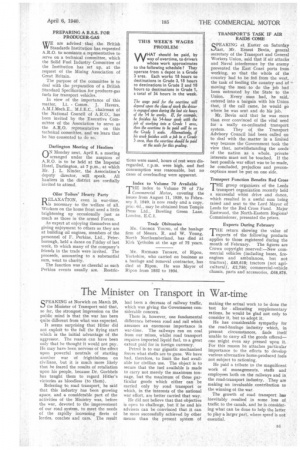The Minister on Transport in War-time
Page 27

If you've noticed an error in this article please click here to report it so we can fix it.
SPEAKING at Norwich on March 29, the Minister of Transport said that, so far, the strongest impression on the public mind is that the war has been quite different from what was expected.
It seems surprising that Hitler did not exploit to the full the flying start which is the initial advantage of the aggressor. The reason can have been only that he thought it would not pay. He may have been nervous of the effect upon powerful neutrals of starting another war of frightfulness on civilians, but it is much more likely that he feared the results of retaliation upon his people, because Dr. Goebbels has taught them to regard Hitler's victories as bloodless (to them).
Referring to road transport, he mid that this industry has been growing apace, and a considerable part of the activities of the Ministry was, before the war, devoted to the improvement of our road system, to meet the needs of the rapidly increasing fleets of lorries, coaches and cars. The result had been a decrease of railway traffic, which was giving the Government considerable concern.
There is, however, one fundamental difference between road and rail which assumes an enormous importance in war-time, The railways run on coal from our mines, whilst road transport requires imported liquid fuel, to a great extent paid for in foreign currency.
Petrol is to our gigantic mechanized forces what shells are to guns. We have had, therefore, to limit the fuel available lor civilian use. The object is to secure that the fuel available is made to carry not merely the maximum tonnage, but the maximum of those particular goods which either can be carried only by road transport or which, in the interests of the national war effort, are better carried that way.
He did not believe that that objective is open to challenge, but if he and his advisers can be convinced that it can be more successfully achieved by other means than the present system of making the actual work to be done the test for • allocating supplementary rations, he would be glad not only to consider it, but to adopt it.
He has considerable sympathy for the road-haulage industry which, in present circumstances, finds itself unable to carry all the goods offered— one might even say pressed upon it. For this reason he attaches particular importance to the efforts to develop various alternative home-produced fuels not subject to rationing.
He paid a tribute to the magnificent work of managements, staffs and employees both on the railways and in the road-transport industry. They are making an invaluable contribution to the winning of the war.
The growth of road transport has inevitably resulted in some loss of traffic to the canals, and he is considering what can be done to help the latter to play a larger part, where speed is not essential.




























































